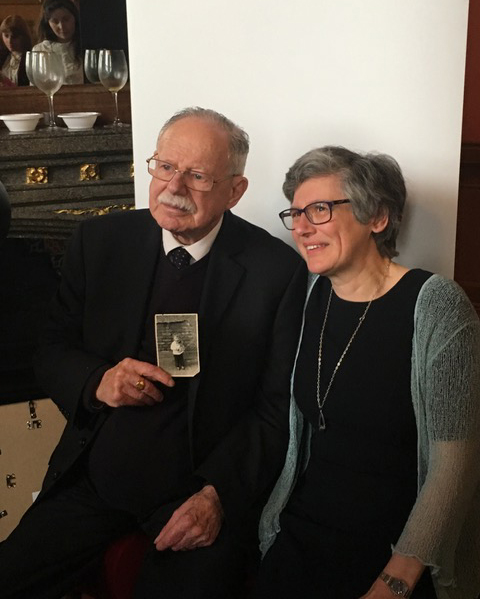Founders & Pioneers

Lily, My Father and Me
By Margaret Jacobi
Lily Montagu is, in a sense, my spiritual grandmother. She inspired, taught and supported my father and he did the same for me. In some ways I became the rabbi I am because of her.
My father came to this country as a refugee with no formal education beyond the age of 14. After the war, whilst living in Amsterdam, he attended the 1949 conference of the World Union for Progressive Judaism and was inspired by Leo Baeck’s speech to become a rabbi. Some doubted that this young man, with a strong German accent and little education, could achieve his aim. But Lily Montagu encouraged him and found ways to make it possible. She suggested he respond to an advertisement for a lay minister in Aberdeen and this enabled him to study Hebrew at the University . Through her, he obtained a Mattuck scholarship to complete his studies in London. When my mother arrived from India to marry my father, they both became regular guests at Lily’s home, the ‘Red Lodge’, for Friday night and we still have her letters of encouragement and of congratulation on my birth. She blessed me as a baby. Sadly, I have no memory of her but I treasure that link.
When I was a teenager, I became more aware of what a remarkable person Lily Montagu was, realising that when she had been my age she had already started youth clubs and innovative services for young people. The more I learnt, the more I was inspired. She was a true pioneer, with the courage of her convictions. She was one of the first women magistrates and factory inspectors. Her youth work is still cited in youth work courses. She was a campaigner for Jewish women’s suffrage movement at the beginning of the 20th century and the abolition of the death penalty in the 1950s. All this was done in humility, with no sense of her own importance. People talk of how simply she dressed and how little she spent on herself. Her initial appearance was unprepossessing but when she blessed the congregation people felt a sense of holiness.
Most of all, what I learn from Lily Montagu is how inseparable her sense of social justice was from her Judaism. She was a person of deep faith, described by Rabbi John Rayner (another of my inspirations) as ‘God intoxicated’.
For my father, too, ethics was paramount in Judaism. I remember vividly his correcting us when as children we had said that Judaism needed ritual to make it different. No, he said, it was not ritual but the ethics that Judaism taught that made it distinctive. He was a person of deep integrity in all his dealings with others. He supported calls for social justice. He was an early member of JONAH, ‘Jews for a nuclear arms halt’. As a refugee himself, he was dedicated to the cause of refugees. At the age of 90, he found renewed purpose when he visited the Calais refugee camp with Lord Alf Dubs. He was deeply disturbed by what he saw there and used his experiences to campaign for child refugees.
In my life and in my rabbinate, I have tried to live up to these exemplars. I was fortunate to have the support and example of both my parents, to whom Judaism was a way of life, influencing all they did and inspiring them to work for others. For me, Judaism and justice are entwined. This has motivated me to become involved in Tzelem, UK Rabbis for Social and Economic Justice. It has led me to join campaigns for social justice and talk about justice to my congregants – who have not only responded but sometimes taken the lead. Travelling with my father and brother to Calais, I have tried to follow him in campaigning for refugees.
My efforts feel small in comparison to the efforts of my predecessors, but that is what role models are for. The term is often lightly used, but for me it means that I have had exemplars who have inspired me and helped me understand what Judaism should be. Lily, my father, and my mother too, have inspired me and even though they are now gone, they remain a presence in my life.
By Margaret Jacobi
Exhibition
Exhibition
Home
Follow



